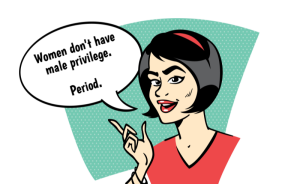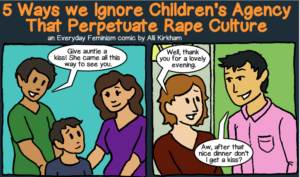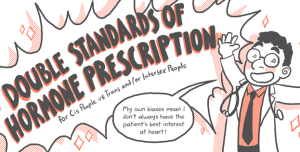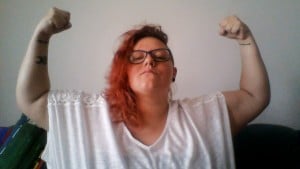
Actress Kristen Stewart stands against a gray background with her hands behind her head, wearing a Clash t-shirt Source: Collider
How many times have you heard the term “girl hate?”
In recent years, the media has picked up on it, reporting stories of rivalries and bullying among middle and high school girls.
Girl hate refers to the tendency among young women to judge each other harshly, usually with the intention of making a girl feel self-conscious about her appearance, body, or sexuality.
And there’s a predominant consensus that this phenomenon is just an extension of young women’s allegedly natural tendency to be catty.
While many of us wouldn’t subject our friends to such criticism, it’s always open season on female celebrities. Women can comfortably unite around poking fun at a famous woman because hey, she chose to be in front of the camera!
But this has to stop.
Which brings me to my favorite celebrity ambassador of helping me process through my girl hate: Kristen Stewart.
Moving From Hate to Love
There was a time when even the mere mention of Kristen’s name would elicit a grimace from me. It was 2008, I was 17, and she had just appeared in the first Twilight film.
Fast-forward six years, and she’s one of my favorite celebrities. I love the way she speaks about feminism and other women. Also, I’ll be blunt and admit that I have a massive queer crush on her.
How exactly did I go from snobby adolescent hater to swooning feminist fan girl?
Thinking back on my evolving worldview and the ways that feminism served as an influence to shape it, the answer was simple.
No matter what Kristen did, I was determined to hate her and knock her down because of internalized misogyny.
In many respects, I initially saw her as my rival. We were about the same age. I was nervous and socially awkward, whereas she was then starring in an incredibly popular movie franchise opposite a slew of hunky boys.
The idea that I was compelled to compare myself to and even envy a celebrity who obviously had no relevance to my personal life shows how pervasive internalized misogyny is.
Every woman is a potential threat to your security and your sense of self. You have to belittle them to reaffirm your superiority.
If there is one thing that can unite teenage girls, it’s hating another teenage girl.
Given Kristen’s franchise and her overnight rise to prominence, badmouthing her became a go-to source of chatter.
Anything that I could think of to mock about her, I did. Down to the most inane of quirks. The way she mumbled, the way she never closed her mouth, her teeth, and her posture.
I didn’t even know her, but each time I put her down, I somehow felt better about myself.
If I could bring attention to all the things I perceived as inadequate or unflattering about her, I hid and minimized my own insecurities.
The problem with criticizing other girls to make yourself feel better is that you’re hurting all women, including yourself, in the process.
And now that I know that, I spend less energy hating on someone else, and more on supporting and lifting up my fellow girls — Kristen included.
Publicity Does Not Make You Public Property
People hate on celebrities all the time. Especially for female celebrities, it’s considered par for the course. You don’t enter show business unless you have a thick skin.
Still, does your status as a public figure obligate you to endure and even invite ridicule from not only one, but millions? I don’t think so.
Celebrities are just trying to do their job, live their lives, and move through space like the rest of us.
It took me a shameful amount of time to realize that Kristen wasn’t my personal punching bag to bully whenever I felt like it. I don’t know her, and yet I was acting like I owned her. Everything she did was automatically mine to prod and poke and scornfully dismiss.
I behaved with the assumption that because she made herself available to public space, she became public property. And that’s just not how humanity should operate.
Conforming to Gender Norms Doesn’t Make You More Worthy of Respect
Moreover, much of my animosity for Kristen stemmed from what I perceived as her inability to conform with gender expectations. She never smiled. She looked awkward in a dress. She never acted bubbly or warm.
Because Kristen didn’t express femininity in ways I deemed appropriate, I inferred that she didn’t deserve my respect.
Sound familiar?
People who don’t conform to gender roles are frequently met with scorn. This is especially true for women. If a woman doesn’t constantly perform “proper” femininity, we look down on her.
Often, this boils down to behavior-policing. A woman can’t be too aloof or opinionated or assertive. We even demonize successful women, like CEOs, as cold and callous because we associate power with masculinity, which “taints” women by desexualizing them.
The message is clear: Either you adhere to a very narrow definition of womanhood or face the wrath of the patriarchy.
I mean, just look at the way we talk about female celebrities. Celebrity culture is a microcosm of society’s social biases. We can chalk up the intense scrutiny to fame or wealth, but what’s really going on is much closer to home.
From a young age, girls are socialized to believe that their self-worth is dependent upon their ability to prove their superiority to other girls. Celebrities are easy targets and guilt-free abstractions to deflect the issue.
If famous people are looked to as role models to reinforce what we understand as cultural normativity, sex and gender is a big component of that — so much so that a woman’s entire career can be invalidated overnight if her nude photos are leaked.
Society dictates that women can only be humanized and are only worthy of respect if they manifest femininity and womanhood in the proper ways.
The scary part is that women and girls readily jump at the chance to reinforce this myth.
Internalized Misogyny in Everyday Life
Let’s revisit internalized misogyny. I used Kristen Stewart as an archetype, but think about just how much the same logic permeates our relationship with every other woman we know or even simply lay eyes on.
It doesn’t matter if it’s your best friend or the grocery store cashier – women are constantly driven to police other women. I’ll admit that I still do it on occasion, subconsciously, even after years of learning about how sexism functions.
If she doesn’t shave, she’s dirty. If she wears socially deemed “inappropriate” clothing, she’s slutty. If she doesn’t smile at you, she must be a bitch.
In those moments, you’re judging those women to determine a) if you’re superior to them, and b) whether or not you like the way they choose to express and carry their body.
And if you don’t like the way they express their body? If they’re not feminine enough to conform to how you think gender and even more critically, sexuality should operate?
Society dictates that it’s completely within your right to belittle them however and as often as you want.
I may be arriving six years late to the common sense party, but it took me that long to fully comprehend the negative side effects of sipping patriarchal Kool-Aid.
The idea that you can personally attack women and girls and erode their self-esteem at the root because they don’t fit your idea of how a woman should look or act goes against every fundamental tenet of basic human decency.
Not to mention how sexist it is. Men don’t have to prove themselves this way because to claim manhood already implies that you’re entitled to take up space — whereas women have to fight each other just to be seen and heard in the first place.
Just think: Robert Pattinson perpetually looks like he hasn’t showered in ten days, but no one writes gossip articles about that.
How My K-Stew Revelation Has Changed My View of Other Women
My adolescent opinion of Kristen Stewart’s allegedly fumbling grasp of womanhood shouldn’t have mattered one iota, and I’m glad she admitted early on that the opinion of such fans has never mattered.
I was an asshole. Plain and simple. All that’s important to me is that she can act semi-well in the movies I pay to see her in, although I have such a crush on her, I’d probably let more than a few box office bombs off the hook.
At the end of the day, women shouldn’t be judged on whether they look or behave femininely enough. Superficial appearances or actions have zero bearing on how a woman conducts herself professionally or in her personal life.
Not your body, not your business, not your problem.
Rather than vilifying women who don’t live up to gender norms, applaud those who are brave enough to break them.
Bringing other women down doesn’t make you look better — it hurts all of us by making us complicit in our own oppression.
We need to encourage each other to expand the definition of what it means to be a woman and how confidence and power are conveyed.
Appropriately, the aspects of Kristen that once infuriated me are now the qualities that I respect most about her.
I love that she refuses to smile on the red carpet. I love that she isn’t constantly monitoring your posture and demeanor. I love that she isn’t willing to manufacture a fake personality for the sake of maintaining a certain image.
She’s taught me an invaluable lesson that the 17-year-old version of myself was scared to acknowledge, let alone process: I can be a woman, and I can be myself, and those two things don’t have to be at odds.
It’s okay to be authentically you. It’s not your burden to please everyone all the time and it’s laughably futile to even attempt to do so.
And not everyone wants to be an actress. (Even Kristen chooses not to act all the time.)
But everyone should be free to move through the world and express their bodies and perspectives however they please. You can’t fault someone for living comfortably within their own skin.
So actually I’d like to thank her for serving as such a benevolent influence as I transformed from a petty, snarky teenager into a socially enlightened, even snarkier adult.
Girls in the embryonic stages of feminism need role models like Kristen to fully come into their own.
[do_widget id=”text-101″]
Erin Tatum is a Contributing Writer at Everyday Feminism. She’s a feminist, queer theory lover, and television enthusiast living in Pennsylvania. She is particularly interested in examining the representation of marginalized identities in media. In addition to Everyday Feminism, she’s also a weekly contributor to B*tch Flicks. Follow her on Twitter @ErinTatum91 and read her articles here.
Search our 3000+ articles!
Read our articles about:
Our online racial justice training
Used by hundreds of universities, non-profits, and businesses.
Click to learn more
Most Read Articles
- « Previous
- 1
- …
- 30
- 31
- 32



















